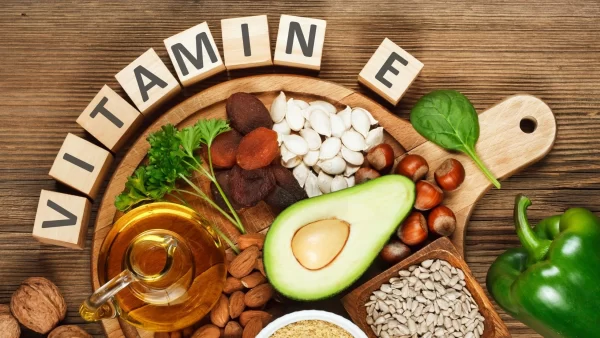Wellhealthorganic.com:vitamin-e-health-benefits-and-nutritional-sources: Vitamin E, like other vitamins, comprises a family of chemically identical compounds that perform similar bodily functions. It is primarily sourced from the foods you consume and is crucial for cellular health due to its lipid-soluble antioxidant properties.
A variety of diseases and ailments, such as aging, cancer, cataracts, and arthritis, may be associated with oxidative stress. Vitamin E addresses these issues, preventing platelet hyperaggregation linked to atherosclerosis and reducing the production of platelet-clumping prostaglandins.
Benefits of Vitamin E:
- Regulates Oxidative Stress: Acts as an antioxidant, combating damage caused by free radicals and preventing inflammation.
- Manages Diabetes: Delays the onset of diabetes by reducing reactive stress in the body.
- Maintains Skin Health: Protects the skin from external damage and aids in the healing of wounds.
- Controls Osteoarthritis Symptoms: Alleviates symptoms by lowering reactive stress associated with osteoarthritis.
- Heals Scars: Therapeutic properties facilitate the repair of damaged cells, promoting the healing of scars.
Also Read : Wellhealthorganic.com know the causes of white hair and easy ways to prevent it naturally
Signs of Vitamin E Deficiency:
- Imperfect vision
- Coordination issues
- Reduced resistance
- Faint muscles
- Numbness, tingling, or peripheral neuropathy
Conditions increasing the risk of deficiency:
- Crohn’s disease
- Cystic fibrosis
- Severe pancreatitis
- Cholestasis Ataxia
Seek medical attention if signs of deficiency are observed, and a blood test may be necessary.
Good Vitamin E Food Sources:
- Plant oils, margarine
- Fruits and vegetables like peaches and asparagus
Supplements often contain alpha-tocopherol succinate or alpha-tocopherol acetate. Natural sources provide a higher concentration of bioavailable vitamin E.
Also Read : Wellhealthorganic.com know why not to reuse plastic water bottles know its reason in Hindi
Excessive Vitamin E:
- Hemorrhagic stroke risk
- Lack of muscle strength
- Fatigue
- Nausea
- Bleeding risk
- Diarrhea
- Headache
- Skin rashes
Vitamin E Deficiency:
- Uncommon in adults
- Occurs with difficulty in handling fats
- Manifests as weak red blood cells and nerve problems
Conclusion
In conclusion Wellhealthorganic.com:vitamin-e-health-benefits-and-nutritional-sources, vitamin E is essential for good health, supporting the immune system and cellular signaling. While supplements may benefit specific health conditions, excessive intake can lead to adverse effects. Most individuals obtain sufficient vitamin E through their diet, making supplements unnecessary for many. It is crucial to maintain a balanced approach to vitamin E intake for overall well-being.
FAQs
1. What is Vitamin E, and why is it important for the body?
Answer: Vitamin E is a fat-soluble antioxidant crucial for cellular health. It protects cells from damage caused by free radicals, plays a role in preventing inflammation, and supports overall well-being.
2. How can Vitamin E benefit skin health?
Answer: As an antioxidant, Vitamin E protects the skin from external damage. Its photoreceptive qualities aid in healing wounds, and its therapeutic capabilities contribute to the repair of damaged cells, promoting the healing of scars.
3. Are supplements necessary for meeting Vitamin E requirements?
Answer: In most cases, supplements are unnecessary as a balanced diet typically provides sufficient Vitamin E. Natural food sources like plant oils, margarine, fruits, and vegetables offer ample amounts of this essential nutrient.
4. Can Vitamin E deficiency lead to specific health issues?
Answer: While Vitamin E deficiency is uncommon in adults, it may manifest as weak red blood cells and nerve problems. Individuals with conditions like Crohn’s disease or cystic fibrosis are at a higher risk and should seek medical attention for testing.
5. What are the symptoms of Vitamin E overdose, and why is excessive intake harmful?
Answer: Symptoms of Vitamin E overdose include a higher risk of hemorrhagic stroke, lack of muscle strength, fatigue, nausea, bleeding risk, diarrhea, headache, and skin rashes. Excessive intake can have adverse health effects and may interact negatively with certain medications. It’s crucial to maintain a balanced approach to Vitamin E intake for optimal health.



